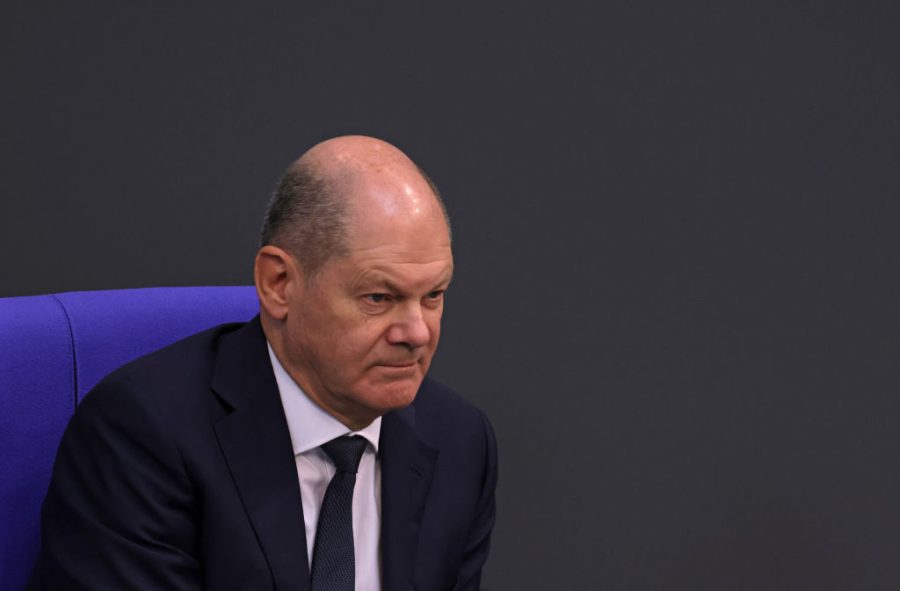This afternoon, for the first time in nearly two years, the German chancellor Olaf Scholz picked up the phone to speak with Russian president Vladimir Putin. The two leaders reportedly spoke for approximately an hour, with Scholz calling on Putin to end the ‘Russian war of aggression in Ukraine’ and withdraw his troops from the country. Scholz also made another demand of Putin, that ‘Russia must show a willingness to negotiate with Ukraine – with the aim of achieving a just and lasting peace’.
During the call, Scholz reportedly condemned Russia’s continued striking of civilian targets in Ukraine and raised the subject of the 50,000 or so North Korean soldiers believed to have been shipped to the Ukrainian front to help prop up the Russian army’s advance. Scholz is said to have warned Putin that keeping North Korean troops in the fight would lead to an escalation of the conflict. Ending the call, the pair apparently agreed to ‘stay in touch’.
No peace deal in Ukraine will be possible without bringing Putin to the negotiating table
Today’s phone call between the pair is not a surprise: German government sources let it be known at the end of September that Scholz wanted to speak to Putin again for the first time since December 2022. Unlike Donald Trump’s reported call with the Russian president last week, Scholz had apparently forewarned Ukrainian president Volodymyr Zelensky of his plans – and appears to be planning to debrief him about the call.
Alongside his statement on Twitter/X announcing that the conversation had taken place this afternoon, Scholz included a softly-lit photo of himself seemingly preparing for the call, sat at his desk, flanked by advisers, staring intently at papers. In doing so, the Chancellor will have been trying to present an air of statesmanship and stability – particularly important following the messy collapse of his government coalition last week and the calling of a snap election in the new year. Trump’s looming presidency and the instability it is expected to bring for Europe on a number of issues, including support for Ukraine, makes the need for a show of strong leadership all the more important.
That Scholz has got his wish to speak to Putin now will be viewed as a diplomatic coup inside the Chancellery – all the more so as the Chancelor gets ready to fight a brutal election campaign in which the issue of ending the war in Ukraine is expected to play a large part. But getting Putin on the phone is one thing; getting him to pay even the slightest bit of attention to Scholz’s message is quite another.
Issuing its own statement following the call, the Kremlin was at pains to point out the initiative for it had come from Berlin. In their words, a ‘detailed and frank exchange of views’ on Ukraine was held between the two leaders, as was a discussion, intriguingly, on the situation in the Middle East. The statement highlighted Putin’s complaint to Scholz that the nadir to which Russo-German relations had fallen to was ‘a consequence of the unfriendly course of the German authorities’.
If the Kremlin readout is anything to go by, much of what Putin had to say to Scholz was things he has already said before. The war in Ukraine, the Russian president said, was ‘a direct result of Nato’s long-standing aggressive policy aimed at creating an anti-Russian bridgehead on Ukrainian territory’. The rights of Russian-speaking citizens of Ukraine had, apparently, been ‘trampled’.
Putin once again claimed that he has ‘never refused and remains open to resuming negotiations’ on the war – something he has stated repeatedly and yet failed to so far follow up with any kind of substantive action. He also reinforced the recognition of Russia’s ‘new territorial realities’ – for which read conquered land – as a precondition for any negotiations, something Germany or any of Ukraine’s allies seem unlikely to do in the near future.
Putin may currently have the upper hand in his war, but even he is aware that his invasion is not indefinitely sustainable. The Ukrainian army claims that Russian losses have risen to an average of 2,000 per day in Moscow’s attempts to recapture land in their Kursk region (partially occupied by Kyiv’s troops since August) and make advances on Ukrainian soil. With the clock ticking down to Trump’s inauguration on 20 January, Putin is trying to snatch as much land as he can before the President-elect potentially attempts to lock in any type of peace deal.
No peace deal in Ukraine will be possible without bringing Putin to the negotiating table. But the Russian president’s phone call with Scholz seems unlikely to pave the way for any substantial breakthrough in the conflict – as much as Scholz would like it to.








Comments